The undercover cop, his lover, and their son
- Published
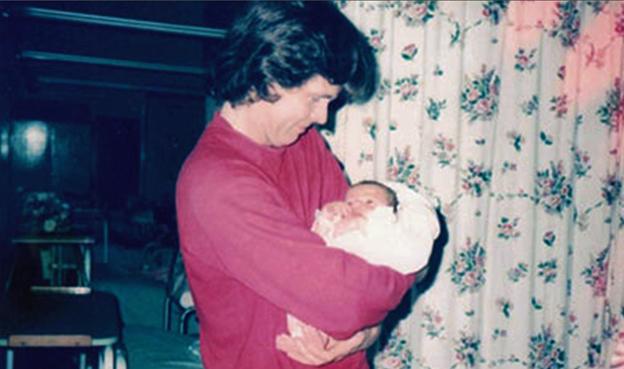
Bob "Robinson" Lambert with his and Jacqui's son
The Metropolitan Police has agreed to pay £425,000 to a woman who did not know the father of her child was an undercover policeman. The unprecedented settlement comes after a long battle by a group of women who say that the police used sex to infiltrate their protest groups. Here is Jacqui's story.
The 14 hours of labour that delivered Jacqui's first child was the most intimate moment of her life. In her words, she shared it with a ghost.
Alongside her as she prepared to bring a child into the world was the man she loved, Bob Robinson. She thought he loved her, too. "Well done Jac," he wrote to her in a note after their boy was born.
That was 1985. Two years later he disappeared into the ether, leaving Jacqui tormented and a toddler without a dad.
Three decades on, Jacqui, former animal rights activist turned suburban middle class woman, knows there was more to Bob than his easy charm, love and a shared desire to change the world for the better.
Bob Robinson was not Bob Robinson, but Bob Lambert - an undercover police officer sent by the Met's then Special Demonstration Squad to infiltrate what commanders suspected were the dangerous fringes of London's animal rights scene.
His extraordinary past was exposed three years ago when some of the former campaigners he stood alongside joined the dots and realised that a counter-terrorism detective turned academic was the same man they'd known many years before.
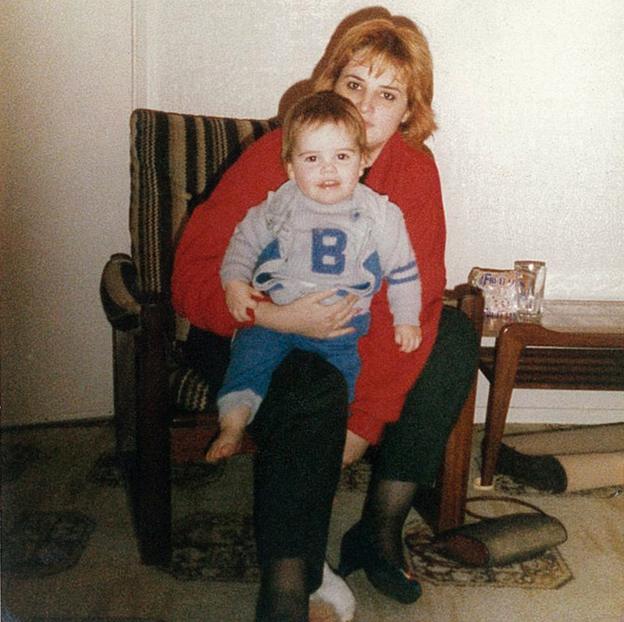
Jacqui was a hunt saboteur when she met Bob
When Jacqui later learnt the truth - after seeing a report in her newspaper - it turned her life upside down.
"Everything I possibly thought of, my foundations don't exist anymore and I don't know if they ever will," she says. "All your turning from a girl to a woman, your first love, your first pregnancy, your first time you give birth, being a mum for the first time, people have all those memories.
"But mine are all tainted. I haven't got them, my foundations are all built on sand, they're not real. Nothing in the past 30 years of my life has been real."
Jacqui was 22 when she first met Bob in 1984. Like her, he was an animal rights activist - although while she was genuinely a hunt saboteur, he was just posing as one to gather information on potential threats to public safety.
Throughout his undercover work, the officer had four relationships with women in groups he was tasked to target, two of them long term. When he formed a relationship with Jacqui, he would spend part of the week with her before disappearing off to join his wife and two children elsewhere.
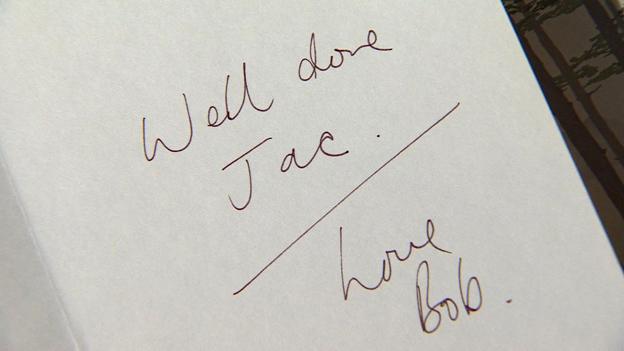
When Jacqui said she was expecting a baby, he did not try to persuade her to terminate the pregnancy. Instead, he said he would stand by her, and she believed him.
"I loved him, I definitely loved him," she says.
"He watched me give birth remember and, to me, he was watching his first child being born. He was there throughout the labour. And that is something so intimate between a man and a woman.
"And I shared that with a ghost, with someone who vaporised. I had a spy who was being paid by the government to spy on me to the extent that he watched me give birth, so he saw every intimate part of me.
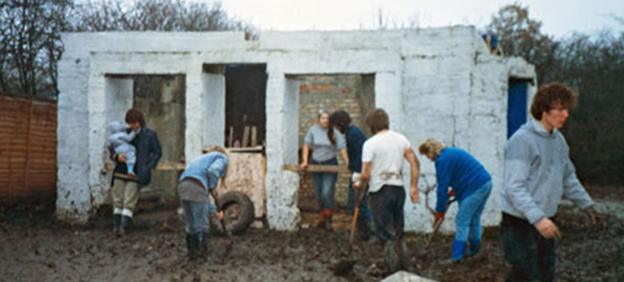
Bob (left) with activists at an animal sanctuary
"How better to get into a protest movement? Not only to have a relationship but to have a child with an activist."
The exact nature of what the SDS and its officers were up to is now the subject of a forthcoming inquiry and a continuing internal police investigation. Former undercover officers have been told they won't face prosecution.
Many of the basic facts about the SDS are already in the public domain. It was formed in 1968 after angry protests in London linked to the Vietnam War. It was tasked with infiltrating groups that Scotland Yard chiefs considered to be dangerous subversives.
Its work was so secret that there were walls within walls within Special Branch. Nobody but a select few knew what it was doing.
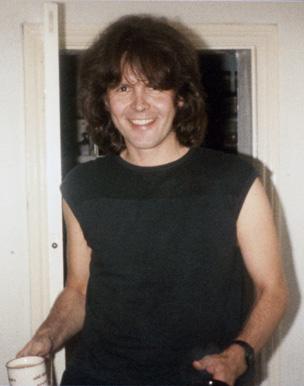
Bob Lambert was on a long-term undercover mission
Officers like Bob Lambert were sent on long-term undercover missions. One of the criticisms of the SDS is that there was little oversight of what officers were doing - meaning nobody could challenge and question the tactics - or help the officers themselves if they got sucked deeper into an undercover alter-ego.
Two years after the birth, Bob disappeared from his second family's life for good. Jacqui had no choice but to move on. She was later fortunate enough to meet a man who fell in love not just with her but her infant son.
When he began to go through the legal procedures for adoption, social services tried to find the natural father.
"I made several attempts, including letters and telephone inquiries to contact Mr Robert Robinson... but I was unsuccessful," said the official adoption investigator in a report.
"An informant, Mrs Moseley who shared the same flat with him [in London], told me that Mr Robinson's whereabouts are unknown. She maintained he is unlikely to surface in the future because of his intense political involvement with the Animal Liberation Movement activities.
"The child's natural father appears to be a wanted man by the police for interrogation."
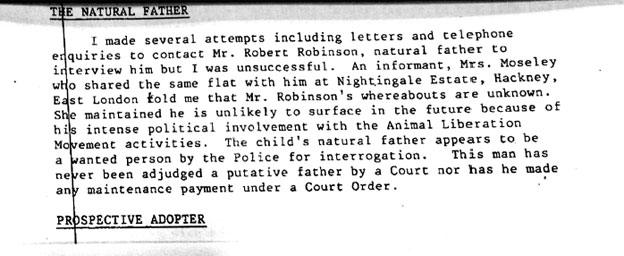
Today, Jacqui believes that Mrs Moseley was a plant - a deliberate attempt by Scotland Yard to discourage her and social services from trying to track down Bob.
Since being exposed, Lambert has apologised to Jacqui and tried to explain the past. But she remains angry that she didn't know that the police officer's other family life took a terrible and tragic turn.
Both of his children in his "non-undercover" life died from a rare genetic disorder. Until he was revealed in public and spoke to Jacqui, she did not know that her son could be facing the same risk.
He doesn't carry the faulty gene in question and he has gone on to form a positive and meaningful relationship with his natural father. Both men value that relationship and want to preserve it amid the bizarre circumstances of their reunion.
Jacqui says she understands and respects her son's wish to know his real father - but Bob Lambert's former bosses inside New Scotland Yard need to reveal why women were targeted.
And that's why she and other women who had relationships with undeclared undercover officers began to sue the Met for damages.
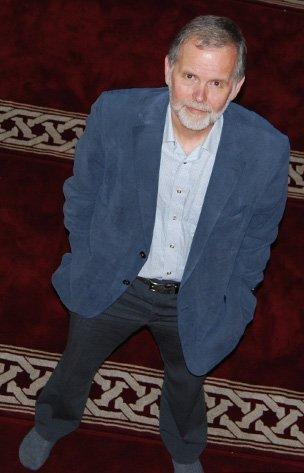
Bob has apologised for mistakes in the past
The Metropolitan Police sought to maintain a legal defence known as "neither confirm nor deny" activity - but it began to crumble as former officers spoke in public - and in the face of clear physical evidence in the shape of Jacquie's son.
"There's six foot of his [Bob's] DNA walking around," says Jacqui. "I have got photographs of them together and yet still the police were refusing to say that Bob had been a police officer at all, neither confirm nor deny.
"What else do they want to do to me - do they want me to just die and go away? I was a pest to them.
"They won't admit that they used sex as a way to gather information and intelligence. Because it all seems to have happened one way - undercover men officers and female activists."
Earlier this year, the Met finally admitted that Bob Lambert and another man, Jim Boyling, had been SDS moles in the protest world. But it also insisted that the force has never had a policy that officers can use sexual relations for the purposes of policing.
That position has been partly backed by Operation Herne, the internal police review of allegations made by former SDS officer Peter Francis.
"There is no evidence at this time to suggest sexual relationships between undercover officers and activists were ever officially sanctioned or authorised by the SDS management," it said.
"However, documents suggest that there was informal tacit authority regarding sexual relationships and guidance was offered for officers faced with the prospect of a sexual relationship."
Operation Herne's author, Derbyshire Chief Constable Mick Creedon, says that training for undercover operations has hugely improved down the years and it is now underpinned by clear law thanks to the Regulation of Investigatory Powers Act.
"There are and never have been any circumstances where it would be appropriate for such covertly deployed officers to engage in intimate sexual relationships with those they are employed to infiltrate and target.
"Such an activity can only be seen as an abject failure of the deployment, a gross abuse of their role and their position as a police officer and an individual and organisational failing."
Both Jacqui and her supporters are unsatisfied with how the Met has responded.
"The amount of money [in the settlement] shows there is a cover-up," says Jacqui. "It says the more we dig the dirtier it gets. All they want to do is concrete it in - put it in a box and make it go away."
"If I had a choice - less money and more truth, I obviously would have gone for that."
Bob Lambert has not responded to a BBC request for comment. He has previously said he wants to apologise to women with whom he had relationships and that he made some serious mistakes.
In a statement, Scotland Yard said: "The Metropolitan Police Service unreservedly apologises for any pain and suffering that the relationship with Bob Lambert, an undercover officer, has had on this woman.
"We recognise the impact that the revelation that he was an undercover police officer must have had both on her and her son.
"From the outset we have dealt with this lengthy case with professionalism and sensitivity, completely understanding the gravity of the circumstances. We regret if this necessarily complex process has added to her distress.
"We want to be, and have tried hard to be, as open as we possibly can. Arguing the need to maintain the policy of neither confirm nor deny in relation to undercover operations has never been a refusal to accept wrongdoing, but has been done solely to protect a vital policing tactic."
Scotland Yard has defended its right to neither confirm nor deny the existence of undercover officers, saying that it has a responsibility for their safety.
However, it added: "Our staff must uphold the highest possible standards, no matter what role they hold. It is important to stress that the MPS has never had a policy that officers can use sexual relations for the purposes of policing."
Follow @BBCNewsMagazine, external on Twitter and on Facebook, external